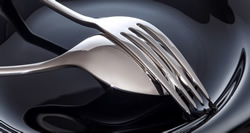Can the Epidemic lead to growth in the local Holloware Industry?
 When South Africa’s 58-million strong population commemorated Heritage Day this year for the most part it was celebrated around a shared meal with family and friends while under Covid-19’s Lockdown Level 1 protocols.
When South Africa’s 58-million strong population commemorated Heritage Day this year for the most part it was celebrated around a shared meal with family and friends while under Covid-19’s Lockdown Level 1 protocols.
Yet, despite a current market demand for cookware, South Africa’s stainless steel Holloware (pots and pans) and flatware sectors (cutlery, trays and serving dishes) are facing an undetermined future; with local manufacturers compelled to import their stainless steel to benefit from competitive pricing; and local retailers preferring to source, stock and sell imported products from the East.
With the sudden shifts in global trade regulations and health restrictions brought about by the epidemic, however, these traditional supply chains, import and export controls and manufacturing models have been disrupted.
The question now lies as to how the future can be transformed through localisation, government and regional policy, and robust business growth strategy for growing the potential for local production, distribution, and extended export markets into Africa?
Positive moves
According to Sassda Market Intelligence and Exports Specialist Lesley Squires comments that local holloware manufacturers will be feeling the market effects of the epidemic, but this will be dependent on the market demand for the range of products which the manufacturer supplies to market.
“We are, however seeing some positive moves in the development of the local sector, for example, AMC Holloware has remained consistent as their products have a solid heritage within the local market and are therefore a popular family and wedding gift item.
“Another local producer Hendler & Hart have also engaged in an intensive18-months revamp of their manufacturing facility. With a new plant and equipment, they expect to start production shortly with the relaunch of their Aloe brand.”
According to Squires, the biggest obstacle facing local development is cheap imports into the market. “Despite the SABS specifying stainless steel grades 304 and 430 in all holloware products sold locally, many imported products are made from cheaper stainless variants. This means there are large quality variances in the holloware products sold in South African, which consumers only discover when they start using a product and experience substandard performance.”
On a more positive note, in terms of future areas of growth for the holloware sector, Squires reports that the government’s Steel Master Plan is currently looking at the designation of local hollowware products. This would mean that state institutions such as prisons, hospitals and schools would be required to use these products.
Looking further afield African export markets also still represent a lucrative market with Sassda members operative in Tanzania, Kenya and the coastal regions of Mozambique supplying the hospitality sector with room for this aspect of their export sales to grow.
Local must be lekker!
For local manufacturer Le Morgan, that manufactures a range of exclusively designed cookware products, they choose to follow a growth strategy within the current evolution of their company.
Having already rallied against and realised growth within local market challenges Le Morgan CEO Graham Morgan says,” There is a huge potential market that could support job creation in local holloware manufacturing but there are also many challenges still to be faced. With no support or benefits available from within the industry, we have managed to establish ourselves independently; to the extent that we are now at the stage where we are moving to larger premises.
“Unfortunately, we have been forced us to import raw materials which are cheaper than buying from local agents. And, if local manufacturers continue to be ignored by South African retailers, very few manufacturers of hollow cookware will survive this period
Le Morgan can claim most of their success to a direct supply chain to consumer demand thereby cutting out the middleman. In 2018, they were also pre-emptive in supporting this demand by importing several new pressing machines, washing tunnels and polishing machines to speed up their manufacturing process.
“We have recently introduced five new designs of aluminium cookware set to launch before the end of this year, which will immediately create new jobs for the Stanger area in KwaZulu-Natal,” confirms Morgan.
The company is also set to explore the lucrative export market opportunities into the rest of Africa and have plans to display its products at global trade shows by the end of 2021.
With aspirations to not only see growth in their manufacture of high-quality stainless steel cookware, but the company has also started redeveloping their processing in their aluminium range, moving from brazing aluminium bases to impact bonding. With a completely new set of tooling for high-quality cookware sets and a cheaper range of tooling for a budget range of cookware onboard, Le Morgan also announced the launch of their new website this month.

